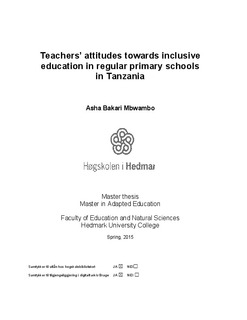Teachers’ attitudes towards inclusive education in regular primary schools in Tanzania.
Master thesis
Permanent lenke
http://hdl.handle.net/11250/2386870Utgivelsesdato
2015Metadata
Vis full innførselSammendrag
The main purpose of this study was to investigate regular primary school teachers’ attitudes
towards inclusive education in regular primary schools in Tanzania. It was a qualitative study
design, aimed at: first, to explore regular primary school teachers’ knowledge and understanding
of the concept inclusive education; second, to examine regular primary school teachers’ feelings
towards teaching students who face barriers to learning and participation in regular schools and
third, to investigate regular primary school teachers’ ability to create inclusive cultures and
evolve inclusive practices in the regular school. Those three specific objectives reflected the
three components of attitudes whereby the first objective assessed cognitive components, second
affective and third behavioural component.
Purposive sampling technique was used to select two regular primary schools from one of the
administrative regions found in Northern Tanzania. The sample included 10 regular primary
school teachers (five teachers from each school).
Data were gathered through personal interviews and non-participant observation methods.
Furthermore, data of this particular study were subjected to transcription as well as thematic
analysis. The study findings were presented in relation to the main themes, categories and direct
statements of the responses of the participants so as to maintain the flavour of the original
information
This study showed that regular primary school teachers who participated in this study have
limited knowledge about inclusive education. The findings also revealed that regular teachers
have negative feelings towards teaching students who face barriers to learning and participation.
Furthermore the study showed that regular primary school teachers have low ability to create
inclusive cultures and evolve inclusive practices in the regular settings. Based on those findings
the study concluded that regular primary school teachers who participated in the study have
negative attitudes towards inclusive education.
During the process of data analysis and categorization of the themes, the findings revealed that
there are some factors which contribute to regular teachers’ negative attitudes towards inclusive
education. Those factors are: lack of inclusive training, low salaries, and lack of motivation, shortage of teachers, lack of enough teaching and learning materials, lack of government support
and poor support from parents and the community at large.
Based on the study findings the investigator recommended that Ministry of Education and
Vocational Training (MoEVT) should provide inclusive education to all regular primary schools
teachers through in-service training, and inclusive education should be included in the
curriculum of general teachers’ education. Teachers’ salaries should be equivalent to their work
load. Government in turn should provide support to the regular teachers in term of relevant and
enough teaching and learning resources and advice. Furthermore parents and the community at
large should provide enough cooperation and cooperation to teachers.
Beskrivelse
Mastergradsoppgave i tilpasset opplæring, Avdeling for lærerutdanning og naturvitenskap, Høgskolen i Hedmark, 2015. Master in Adapted Education. Faculty of Education and Natural Sciences. Hedmark University College, Spring, 2015.
